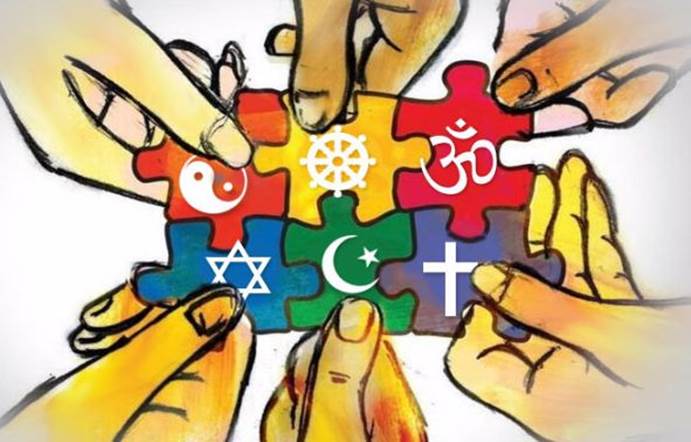Description

Copyright infringement not intended
In News
- The Madhya Pradesh High Court denied the state government from charging “adult citizens if they solemnize the marriage of their discretion” and violates Section 10 of the Madhya Pradesh Freedom of Religion Act (MPFRA), 2021.
Background
- In March 2020, the state government of Madhya Pradesh proposed a law to tighten restrictions on religious conversions.
- The new law was intended to replace the existing Madhya Pradesh Dharma Swatantrya Adhiniyam, 1968.
- The 1968 law faced a challenge in the High Court, but it had been upheld by the Supreme Court in 1977.
- In January 2021, an ordinance was promulgated and in March 2021, the Madhya Pradesh State legislative assembly has passed the Freedom of Religion Act, 2021.

Main provisions of the Madhya Pradesh Freedom of Religion Act (MPFRA), 2021.
- Section 5 of the act prohibits unlawful conversion from one religion to another by use of misrepresentation, force, undue influence, coercion, or any other fraudulent means, allurement, or promise of marriage.
- Violators of the provisions would face imprisonment between one year and five years.
- If the person who is converted is a child, a woman, or a person belonging to a Scheduled Tribe or Scheduled Caste, the punishment varies from 2 years to 10 years, with a fine of 50,000.
- The punishment for mass conversions is between 5 to 10 years in prison, with a penalty of Rs 1 lakh.
- Cases under the Act are cognizable (which means an arrest can be made without a warrant) and non-bailable.
- The accused can get bail for a non-bailable offence; in this case, Bail can be obtained from Sessions Court or High Court, depending upon the seriousness of the offence the accused is charged with and the discretion of the court.
- For a bailable offence: A person doesn’t need to go to court, as it is given by the Police Officer.
- Complaints can be registered by the victim, the victim’s parents or siblings, or anyone else.
- The complaint will be investigated by a police officer of the rank of sub-inspector and above.
- Section 10 of the act; for a religious conversion to be valid, the law requires a 60-day prior “declaration of the intention to convert” to the district magistrate by the individual as well as the priest carrying out the conversion.
- It is only after this, that a couple from different religions can be legally married.
- Failure to notify the state of the intent to convert will cause the wedding null and void, and an individual can be prosecuted for defrauding conversion on the promise of marriage.
- A priest who fails to notify the government can be punished with imprisonment from 3 to 5 years and a minimum fine of Rs 50,000.
Religious conversion
- Every individual has a natural entitlement to religious faith and freedom of conscience, a right to adopt or abandoned any faith of his own choice. Religious conversion means adopting a new religion, a religion that is different from his previous religion or religion at his birth.
- Reasons behind religious conversion:
- Conversion by force.
- Conversion by offering a better life. It means offering economic incentives for one to come out of the religion.
- Conversion for marriage.
- Conversion to escape the rigid hierarchical system caste system.
- Conversions by free will or free choice as the tenets of other religions appear closer to the person.
- Conversion to get reservation benefits.
- At the central level, India does not have any law which provides any sanction in case of forcible conversions. In 1954, an attempt was made to pass the Indian Conversion (regulation and registration bill) but Parliament failed to pass it due to heavy opposition. The need of the hour is to pass a strict anti-conversion bill to curb forced conversion in society.

Arguments in favour of an anti-conversion bill
- These laws only ban and punish forceful religious conversion.
- Fundamental rights under Article 25 ‘Right to propagate a religion” did not extend to forced conversions.
- There is no fundamental right to convert another person to one's religion.
Arguments against the anti-conversion bill
- According to some activists, “Such laws are used to target religious minorities and interfaith couples”.
- These laws would be used to target even voluntary conversions and curb the fundamental rights of “Freedom of conscience” under Article 25.
- These Acts do not satisfy the test of reasonableness and fairness and also go against the fundamental rights under Article 14 and Article 21” of the Constitution.
Way forward
- Anti-conversion laws have been challenged in courts ever since Odisha moved the first such legislation in 1967. However, the courts have a mixed record defending the freedom of choice about religion, ruling in favour of individual liberty in some cases but not in others.
- The High Court on many occasions clearly said that while a person has the right to believe and the right to change their beliefs, they also have a right to keep their beliefs secret.
https://indianexpress.com/article/explained/explained-law/mp-conversion-law-illegal-hc-8279689/
https://t.me/+hJqMV1O0se03Njk9














